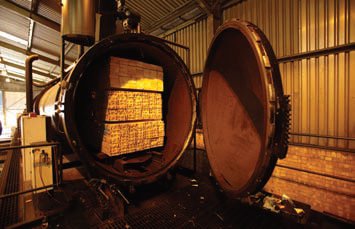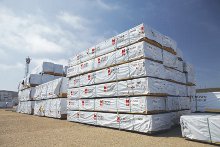From ship to shore
2 November 2013UK ports aim to help their timber customers improve efficiencies. Keren Fallwell reports.
The volume of timber coming in through UK ports has been curbed over the past five years. It's a trend that's reiterated in the Timber Trade Federation's latest figures, which reveal that in the first seven months of this year, the volume of the main timber and panel products imports was down by 126,000m³, or 2.6%, on 2012. However, it's more positive news for July, when the total import volume rose by 4.3% on the year - only the second increase in the seven-month period.
However, this has not been reflected in movements at all ports, especially in busy southeast England.
At the Port of Medway, timber volumes handled have doubled over the past three years, and rose by 38% in the last year alone. At Forth Ports' Port of Tilbury, there has been little change in overall volume.
"We handle products for Travis Perkins, Meyer Timber, Caledonian, Jewson, Altripan, James Latham, International Timber, International Plywood and MBM so we have a large range of receivers, importers and users which gives us a level of protection," said the port's senior asset manager Paul Dale.
Although volumes handled are largely unchanged, there is less stock on the ground.
"People have certainly taken steps to reduce their stockholdings and take cash out of the supply chain. The overall volume coming through is being done on a smaller footprint within the port," said Mr Dale.
There's been a similar trend at Peel Ports' Port of Medway.
"During the economic downturn companies have shown much closer attention to stock management so the average dwell time has reduced," said port director Miles Hearn. "It puts pressure on us in terms of speed of throughput."
The Port of Medway has a long history of handling timber - illustrated by the fact the offices are housed in a former timber facility, complete with the original saw pits - and Mr Hearn said it has huge potential too.
"With the rebirth of construction in the south-east it's clear that a significant focus for us has to be facilitating construction, particularly around timber and other commodities," he said.
One of its main timber customers is Crown Timber. Crown established a south-east base at Ridham Dock in 2000 and in 2010 moved to Medway. It moved its two low-pressure treatment plants and Protim Fireguard treatment plant and added a high-pressure facility.
Following Crown's model at other ports, the treatments plants are operated by the port authority.
"It's letting experts do what experts do," said Simon Henry, Crown Timber plc's operations director.
Part of a solution
This is what Mr Hearn refers to as being a "meaningful part of a solution" for the port's customers, which includes taking into account their ambitions when it comes to future plans.
"It's not about our capability, it's about our longer-term potential and our ability to work with customers to facilitate their ambitions," he said.
"For businesses in commodity markets sometimes it's difficult to make an investment. If we can invest on the back of supporting our customers to meet their aims then it makes sense for both parties."
Mr Hearn is to develop a 20-year master plan for the Port of Medway, but in the meantime developments continue. At the port's Sheerness dock four former cold stores, made redundant by the trend to containerise fresh product, have been converted into ambient storage, and the port has around 20 acres ripe for redevelopment. This means there is capacity for other businesses in the supply chain, such as prefabrication.
As an example, Mr Hearn cites Chatham docks where an importer brings steel into the docks and related businesses have set up on site to manufacture tunnel segments.
"I'm interested in how we create that degree of connectivity because if we can it's great business for everyone," he said.
"Ports tend to focus on volume and what you have in terms of infrastructure but I think that's wrong. I think it should be on the value you can create for your customers and how you can make it a more durable business over time."
The Port of Tilbury also works with customers to improve supply chain efficiencies, especially through portcentric logistics. "Most if not all of our forest products customers use the port as southern distribution hubs," said Mr Dale.
"Increasingly we're talking to our customers to help them get the most cost-effective supply chain routing, in or out of the port," he added.
"The concept of bringing your storage closer to the port of origin is something the forest products sector has always done. We always look to enhance and expand that and the portcentric operators at Tilbury certainly give us another string to our bow."
Now Tilbury is expanding its portcentric facilities with the 70-acre London Distribution Park which will include 84,000m² of "logistics accommodation".

